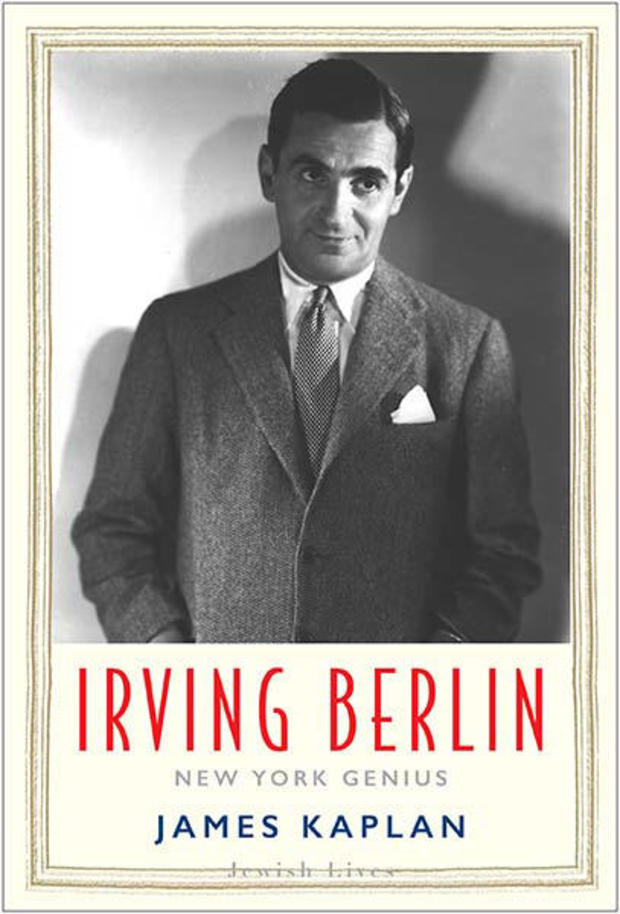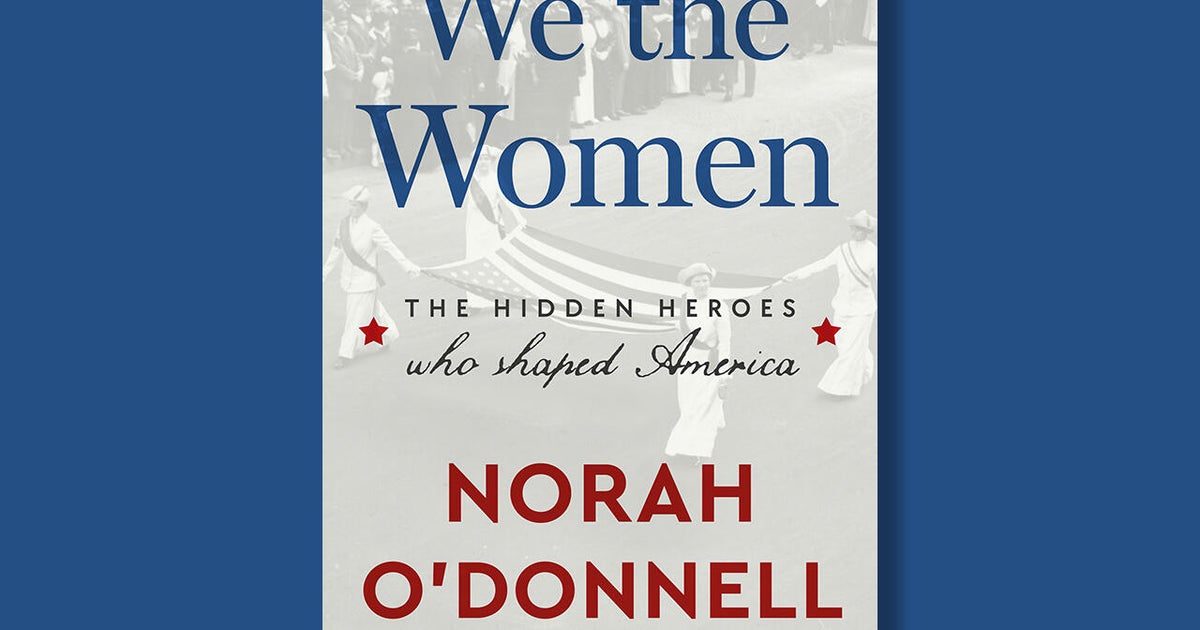Book excerpt: "Irving Berlin: New York Genius" by James Kaplan
In "Irving Berlin: New York Genius" (Yale University Press/Jewish Lives), author James Kaplan, who has penned biographies of Frank Sinatra, writes of the origins of the great American songwriter Irving Berlin (1988-1989), whose songs (such as "White Christmas" and "Easter Parade") helped define an American musical vernacular born, in part, from his Lower East Side roots in New York City.
Read the excerpt below, and don't miss Mo Rocca's story about Irving Berlin on "CBS Sunday Morning" December 22!
At what age Irving Berlin began to vocalize in public is anybody's guess – accounts of his early years, especially his own, are hazy at best – but it seems plausible that he first became a sidewalk entertainer of sorts not long after he started working as a newsboy, at about age eight, hawking William Randolph Hearst's sensationalistic New York Journal on the hard streets of the Bowery. It was a business whose minuscule profit margins (half a cent per paper sold) rewarded only the most energetic and assertive – but then from childhood, Izzy Baline seems to have been what is called in Yiddish a bren. From the German word brennen, to burn. "Someone of great energy, vivacity, competence, and optimism," according to Leo Rosten; "a 'fireball.'" Good-looking in a small and dark way; quick on his feet and quick-witted.
His first ambition was to be a cartoonist – a profession that had just become big business. In 1896, around the time the eight-year-old Izzy hit the streets as a newsboy, Hearst's Journal stole the nation's premier cartoonist, Richard F. Outcault, from Joseph Pulitzer's New York World. Outcault had created a national sensation with his comic "Hogan's Alley," set in a fictional slum populated by children of various ethnicities, chief among them a shaved-headed boy known (for the color of the smock he wore) as the Yellow Kid.
Young Izzy, with a bundle of Journals in his bag, would certainly have had plenty of opportunity to look over Outcault's work, which often appeared on the front page, and no doubt he gazed with admiring recognition at the antics of the Kid and his pals, marveling at Outcault's ability to render the chaotic essence of tenement life with a few strokes of his pen. This was storytelling at its most economical, thoroughly American in style and substance. And the storyteller was, no doubt, a very rich man.
Izzy had seen boys and men make money by drawing caricatures in chalk on the sidewalk. He decided to give it a try himself – he had a lot of funny ideas – but discovered he wasn't much of a draftsman.
What he could do was sing.
A half-cent profit per paper wasn't much. But Izzy found that if he broke into song, the paper buyers might toss an extra penny or two his way.
He could keep a tune. "The boy had a clear, true soprano voice – a plaintive voice tuned to the grieving of the schule [sic]," Berlin's first biographer, Alexander Woollcott, wrote.
To which one is tempted to say, Oy. But then, Woollcott, who was taking his close friend's measure in 1925, when Berlin was all of thirty-seven, was, in an era of unapologetic Waspocracy, a Wasp mandarin – the New York Times's chief drama critic, a columnist for the New Yorker, and a charter member of the Algonquin Round Table (where Berlin occasionally sat in) – who wrote with affection and florid verve, not to mention a certain ham-handedness common to the age, when it came to matters Judaic. At any rate young Israel Baline, as a recent greenhorn eager to oysgrinen zikh – literally, de-green himself – would have been eager to get out of shul and onto the street.
The end of the nineteenth century was a time of rich cultural ferment in America: the young nation was casting off European influences and forging a brash, demotic personality of its own, in politics, literature, even popular music. And for music, New York City was the hot center of the action. Vaudeville had begun here in 1881, at Tony Pastor's theater on 14th Street near Third Avenue, when that impresario realized he could instantly double his audience for variety shows by cleaning up the material and banning the sale of alcohol on the premises, thereby bringing in women as well as men. Shows needed songs, and by the middle eighties, music publishers began to cluster in the Manhattan neighborhood just north of Madison Square that would soon come to be known as Tin Pan Alley. With the explosive growth of piano manufacturing in the late nineteenth century – suddenly every middle-class home had to have an upright – came huge growth in the market for sheet music: in 1892, Charles K. Harris's ballad "After the Ball" became the first popular song to sell a million copies.
In those preradio days, music was to be heard everywhere on the streets of the city – from street musicians, or buskers, who played the hurdy-gurdy, street piano, or spoons, or just stood there and sang; from the upright pianos found in every saloon and aspiring middle-class parlor.
Izzy Baline would have taken it all in, would have heard "After the Ball" and "Little Annie Rooney" and "The Sidewalks of New York" and "A Bird in a Gilded Cage," and "The Band Played On" and dozens of other tunes of the late nineties and early aughts: drippingly sentimental, most of them, as was the style of the day, and many of them in waltz time, a carry-over from Europe. The schmaltziness of these songs made them highly susceptible to parody if one were of a satirical turn of mind, and Izzy Baline, who was, may have begun creating racy special lyrics as early as his newsboy days.
Then his life imploded.
In his accounts of his boyhood, Irving Berlin tended to polish up the same select bunch of chestnuts again and again: the getting-knocked-off-the-dock-by-the-crane story (he was fished out of the water still clutching the five pennies he'd made selling papers that day). The yarn of how he pawned, bit by brass bit, the samovar his family had brought over from the old country. The tale of how he learned about Christmas by going across the street to his poor Irish neighbors, the O'Haras, whose stumpy and scraggly Christmas tree, the ancestor of Charlie Brown's, nevertheless seemed to young Izzy to "tower to Heaven."
What he never discussed, with his three daughters or with his French son-in-law Edouard Emmet, with whom Berlin liked to reminisce as the two men strolled the sidewalks of Paris together in the 1960s, was the death of his father when Izzy was thirteen.
In later years, Irving Berlin spoke only obliquely, and with insistent nostalgia, about his early days. "Everyone should have a Lower East Side in their lives," he said. Close to sixty, he told the New York Sun:
I never felt poverty because I'd never known anything else. We had an enormous family. Eight or nine in four rooms and in the summer some of us slept on the fire escape or on the roof. I was a boy with poor parents, but let's be realistic about it. I didn't starve. I wasn't cold or hungry. There was always bread and butter and hot tea. I slept better in tenement houses . . . than I do now in a nice bed.
Speaking to his son-in-law, Berlin slightly fleshed out the story: "He said that in the summertime, the tenement became unbearable," Emmet recalled. "They were crowded – there was him and his brother, surrounded by his sisters and mother; his father quickly was no longer there."
The only record we have of Moses Beilin's passing is a stark one: his New York City death certificate, dated July 19, 1901. The cause of death is listed as chronic bronchitis and arteriosclerosis. He was fifty-three.
And his youngest child was thirteen.
* * *
In all likelihood, Izzy made the decision that September, when he would have been about to enter the seventh or eighth grade at P.S. 147 on East Broadway. A quick study, he had taken in all he felt he needed to know: grammar and penmanship and arithmetic, the fundamentals of civics. School – especially with just a few dollars a week coming into the household – was now quite superfluous.
But the household itself?
Woollcott describes young Izzy's leave-taking from 354 Cherry Street:
As far as he knew, there was always enough to eat stewing away on the back of Mother Baline's stove. ... But, he knew, too, that he contributed less than the least of his sisters and that skeptical eyes were being turned on him as his legs lengthened and his earning power remained the same. ... Finally, in a miserable retreat from reproaches unspoken, he cleared out one evening after supper, vaguely bent on fending for himself or starving if he failed. In the idiom of his neighborhood, where the phenomenon was not uncommon, he went on the bum.
Berlin told a rather different tale to his family, recalling, according to the eldest of his three daughters, Mary Ellin Barrett, his "uncomfortableness with a household of nothing but women – Ben had moved out – and a certain desire to get away from all the women."
Izzy already knew the Bowery well. He had acquired a street education there, selling his papers along raucous sidewalks deeply shadowed by the Elevated tracks. The district was, Berlin biographer Edward Jablonski writes, "the place to go for entertainment, inebriation, drugs, prostitutes, and colorful characters. In addition, it was the locus of fleecing, robbery, venereal diseases, and even murder."
Now and then the newsboy would step into one of the saloons – where minors were of course expressly prohibited – to try moving a few Journals. Here he found a different kind of clamor than on the street: the pounding of an out-of-tune upright, drunken singing and bragging and joking and ragging. And once, perhaps, amid the din, a high voice, piping:
She's only a bird in a gilded cage,
A beautiful sight to see,
You may think she's happy and free from care,
She's not, though she seems to be ...
Izzy would have watched the drunken men as the urchin sang: some ignoring him, some laughing scornfully; but not a few discreetly wiping away a tear at the memory (or the dream) of such innocence. Then a coin was thrown at the boy's feet, and then another and another – Indian-head pennies mostly, but here and there a buffalo nickel or Liberty dime. The kid scuttled to grab the loose change.
An instant later, the bouncer was grabbing the kid by the arm and slinging him out the door. But he had his dinner money.
And Izzy, looking on with fascination, had a plan.
From "Irving Berlin: New York Genius" by James Kaplan, published by Yale University Press/Jewish Lives. Copyright © 2019 by James Kaplan. Reprinted by permission.
For more info:
- "Irving Berlin: New York Genius" by James Kaplan (Yale University Press/Jewish Lives), in Hardcover and eBook formats, available via Amazon
- jameskaplan.net
- irvingberlin.com




